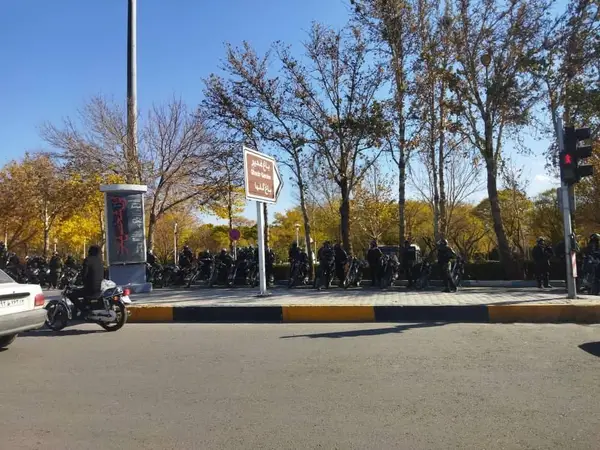Authorities blocked access Friday to the dry riverbed in Esfahan, where those who protested the previous Friday planned to congregate at noon for prayers.
According to postings on social media, police and security forces including Basij militia deployed around the city's landmark Khajoo Bridge, the center of last Friday's protests, and in nearby areas.
Security forces also set up checkpoints in the city. Two videos acquired by Iran International show a roadblock, and dozens of riot police and other security forces maneuvering on motorcycles.
The large-scale police operation on Friday amounted to an undeclared martial law in the city.
The few people managing to tweet from Esfahan Friday said mobile internet was disrupted and that wi-fi connections were too slow for their photos and videos. Some also reported disruption to mobile phone connections.
Mohammad-Reza Mohammadi, chief of Esfahan traffic police, announced Thursday that roads along the river and leading to the bridge would be closed to cars, motorcycles and pedestrians from 5am Friday, and parked vehicles would be clamped and removed.
An anonymous call was widely circulated on social media in recent days called for people to gather for Friday prayers in the dry bed of Zayandeh Roud. Germany-based journalist Mehdi Mahdavi-Azad told Iran International this was a “very clever move” to draw people away from the usual Friday prayers led by “state-appointed imams.”
While security forces prevented people from reaching the river bed, Mojtaba Mirdamadi, the Friday prayer imam of Esfahan, said previous administrations had ignored the plight of farmers facing water shortages and that the issue lay now “in God's hands." Mirdamadi in previous times criticized the government of former president Hassan Rouhani for alleged mismanagement of water resources.
"We hope rain sent by God will solve all the problems," Mirdamadi told his congregation and advised them to hold special prayers for rainfall.
In Mashhad in north-eastern Iran, Friday prayer leader Ahmad Alamolhoda told those congregated that that among last week's protesters had been "mercenaries of the enemy" who had used Molotov cocktails. He said the people of Esfahan would not “oppose the Revolution for the sake of food and water.”
Authorities and state media in the past few days called the call for Friday’s rally politically motivated and suggested "rioters" were trying to take advantage of water protests.
Esfahan’s governor, Mohammad-Ali Ahmadi, said in a radio program Thursday that no one had applied for a permit to protest. He argued that that the authorities had heard farmers' voices and that farmers had realized "anti-revolutionary groups" were looking to manipulate any protests. "Security forces will prosecute those who spread rumors and fake news on social media," he warned.
The Islamic Republic routinely ignores applications requesting permit for political gatherings and only issues permission for rallies organized by the government. When a group congregates for a protest, they are usually dispersed or arrested.
Esfahan farmers' union in a statement Wednesday said it was not planning further protests Friday. Many on social media have alleged they had been coerced by security forces.
The justice department of Esfahan province said that in a statement Thursday that farmers no longer intended to protest, so that protests on Friday would be unjustified, illegal, and aimed at "abetting and aiding the enemies of the Islamic Republic.”
